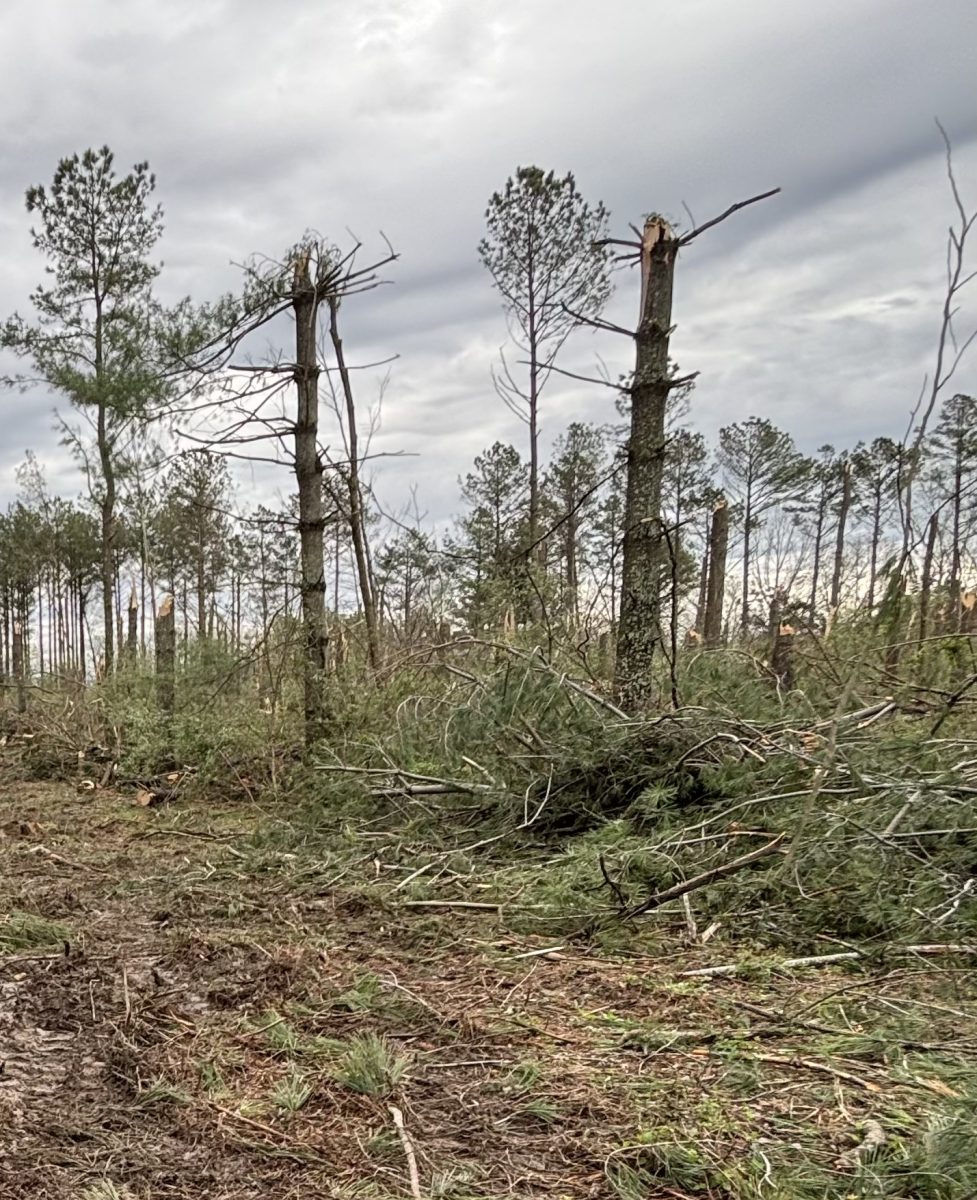Some say new Title IX regulations may have holes that prove harmful to survivors
August 31, 2020
Earlier this year, on May 9., U.S. Secretary of Education Betsy DeVos announced a new set of Title IX regulations that will be enforced starting in the fall semester of 2020.
The original Title IX laws were passed in 1972 and were made to prevent sex discrimination on campuses across the nation. The new statutes introduced by DeVos expand on issues dealing with both victims of sexual misconduct and those accused of misconduct.
“Our new Title IX rule provides new and meaningful protections for survivors of sexual harassment/assault and balances the scales of justice on campuses across America,” DeVos said in a May 6. Tweet.
Advertisement
A May press release from the U.S. Department of Education said that this sweeping legislation was “made by DeVos to strengthen Title IX protections for survivors of sexual misconduct and to restore due process in campus proceedings to ensure all students can pursue an education free from sex discrimination.”
The legislation, according to the overview from the Department of Education, is meant to take into consideration past incidents where those identified as perpetrators had been proved to be falsely accused of sexual misconduct and implement a fair proceeding without putting victims at risk.
“Too many students have lost access to their education because their school inadequately responded when a student filed a complaint of sexual harassment or sexual assault,” DeVos said in early May. “This new regulation requires schools to act in meaningful ways to support survivors of sexual misconduct, without sacrificing important safeguards to ensure a fair and transparent process. We can and must continue to fight sexual misconduct in our nation’s schools, and this rule makes certain that fight continues.”
According to an article from The New Yorker, many civil rights attorney’s and officials expressed their disapproval of the new statutes as they feel that these regulations will prove harmful to survivors and present new difficulties to students wishing to report sexual misconduct.
Lead medical and legal advocate for the Women’s Center in southern Illinois, Anna Hughes, is in agreement with these officials and said that the new legislation will make it difficult for schools to investigate sexual misconduct cases and give students who are victims proper accommodation.
The Women’s Center provides aid to victims of sexual assault, harassment and abuse, doing so free of charge and keeping victim information confidential.
“A lot of our cases that we get are from SIU,” Hughes said. “When someone has been sexually assaulted or experiences sexual harassment, or anything related to that and they go to the hospital, the hospital calls us to provide in-person counseling and advocacy. We can help with orders of protection, navigating the court system, and we provide individual and group counseling as well.”
Advertisement*
Hughes said that she and the staff at the Women’s Center stay updated on the laws dealing with Title IX in order to help students that may need assistance navigating the process of filing a report dealing with sexual misconduct.
The staff at the Women’s Center want to help support victims through the process of filing a report and allow them feel comfortable in making an informed decision, Hughes said.
As far as what these legislation changes will look like on campus, SIU Title IX coordinator Kay Doan said that hearings will now be live in order to promote transparency in the hearing process.
“A couple of the larger changes are [that] there will now be a live hearing, that’s one of the major changes,” Doan said. “After a complaint is investigated, there will be a live hearing where the complainant and the respondent […] will be in separate rooms. The process is supposed to be transparent to the participants where all the evidence is known and shared prior to the final decision. This should provide an impartial, fair and thorough review of all the allegations.”
Doan said that the university’s policies were updated recently because of the new Title IX regulations and that they are updated as needed.
The new policies were extensive, adding up to be 51 pages long and the Title IX office at SIU had to make major changes to school procedures in order to be in compliance with the new regulations, Doan said.
DeVos’s new law also expands on proceedings that concern reports of misconduct taking place off-campus.
The regulations state that universities are only required to investigate reports of misconduct that occur on properties owned by, or under the control of, school sanctioned organizations when dealing with off-campus complaints.
According to a 2020 Title IX fact sheet from the National Women’s Law Center, this particular clause allows universities to ‘dismiss all complaints of sexual harassment that occurs during study abroad programs or that occurs outside of a school program.”
“This rule will be devastating for students who are sexually assaulted while studying abroad, at a fraternity that isn’t officially recognized by their university, or in off-campus housing, or who are harassed or stalked online outside of a school-sponsored program, and then forced to continue attending class with their rapist or abuser—or even a class taught by their rapist or abuser,” a statement in the May 2020 fact sheet said.
The fact sheet also addresses issues with respondent enrollment, formal complaint formatting and live victim cross-examination in hearings.
Doan said the protocol used for these off-campus reports mirrors that of the guidelines followed for on-campus reports.
Also among the new regulations, is a clause that defines sexual harassment to include sexual assault, dating violence, domestic violence, and stalking, as unlawful discrimination on the basis of sex, according to the May press release from the Department of Education.
Hughes said that this new definition can create restrictions for victims lodging complaints against perpetrators.
“That is one of the parts [of the new legislation] that is harmful because before under Title IX, sexual harassment was a general definition of unwelcome conduct of a sexual nature.,” Hughes said. “Under these new updates, there are much stricter requirements, either quid pro quo sexual harassment or the big one is basically, what defines sexual harassment. It [now] has to be severe, pervasive and objectively offensive, so that it denies a person equal access to the school program or activity.”
This means that schools have to ignore complaints of sexual harassment unless the victim can provide proof that the severity of the issue is affecting their ability to concentrate, do work or attend classes, Hughes said.
Doan said that it is hard to predict whether or not these new policies will be harmful to students because the SIU Title IX Office has not yet received any reports of misconduct since the update.
“The Department of Education issued the new rules and regulations to provide strong due process protection to those who are accused, while also balancing the rights of those who [are victims],” Doan said. “It may be difficult for some victims to appear before the live panel, but [if the rules are harmful to victims], that will be difficult for us to know right now because we haven’t had any cases yet.”
Hughes said that the sole purpose of Title IX legislation, which is meant to protect victims, is now leaving them susceptible to more serious levels of abuse.
“Survivors are having to experience repeated and escalated levels of abuse before it can be taken seriously and investigated,” Hughes said. “I think that’s incredibly harmful because the whole purpose of this law is to protect survivors and prevent abuse before it gets that severe.”
According to Title IX investigator Casey Parker, when students lodge complaints, the Title IX office reaches out to victims asking how they wish to proceed and whether or not they want to file a formal complaint. From there, they make arrangements with the university’s confidential advisor, based upon the victim’s request, and launch an investigation that eventually leads to a hearing.
The verdict in all Title IX hearings is decided by a panel selected by the SIU Title IX Office. A new panel is currently in the process of being selected.
“We are still identifying those that will be used in the panel,” Doan said. “We certainly have a diverse group of individuals that we are looking at, that’s very important to us, but they have not been [selected] yet.”
Doan said she is uncertain of when the final selection of members will take place, but when the selection is made, the new panel members will receive training.
Hughes said that the new regulations could be refined and that previous Title IX regulations presented a good foundation for misconduct proceedings but were vague in terms of intricate details leaving room for interpretation.
By refining the language used in the statutes and consulting with agencies who have first hand experience with victims, the new regulations can be improved, Hughes said.
As far as what can be done on campus, Hughes said she feels that victims can be given more clarity when it comes to the process of reporting sexual misconduct and pursuing justice.
“I think, since I was a student at SIU, something that I think could be helpful is emphasizing options for students. So talking about different avenues of communication, emphasizing who is a safe person to talk to if they’re experiencing abuse and being very clear and transparent about resources for people. […] I know sometimes it can be confusing to people and they don’t really know where to start if they’re experiencing something like abuse, so having that be very clear and emphasized as a priority from the university would be helpful,” Hughes said.
Editor Tāmar Mosby can be reached at tmosby@dailyegyptian.com or on Twitter at @mosbytamar.
To stay up to date with all your Southern Illinois news, follow the Daily Egyptian on Facebook and Twitter.
Advertisement







